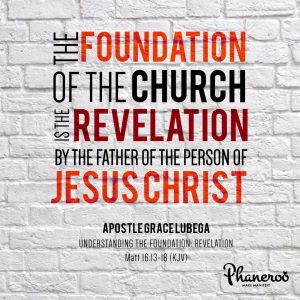A Love Deeper Than The Past
Apostle Grace Lubega
Romans 8:38-39(KJV); For I am persuaded, that neither death, nor life, nor angels, nor principalities, nor powers, nor things present, nor things to come, Nor height, nor depth, nor any other creature, shall be able to separate us from the love of God, which is in Christ Jesus our Lord.
 Love does not dwell on the past.
Love does not dwell on the past.
In our theme scripture, the Bible speaks of the love of God and that nothing can separate us from it.
He speaks of death, life, angels, principalities, powers, things present, things to come, height, depth or any creature.
The language of the scriptures is deliberate. He speaks of things present and things to come but does not mention the past.
This is because to Him, it is inconsequential.
God does not look at you, the new creature in Christ through the lens of what you did yesterday, last week, last month or ten years ago.
That’s why His mercies are new every morning.
There are people who are stuck in their past and believe that it has withheld the hand of God from their lives. Other people are stuck in other people’s past and treat them based on the standard of what they did years ago.
That is not the way of God. You have a future and it is solid in agapé.
FURTHER STUDY: Lamentations 3:22-23, Ephesians 3:18
GOLDEN NUGGET:
Love does not dwell on the past.
PRAYER: Father God, I thank you for your never ending love toward me. I thank you because I am a new creature in Christ, old things are passed away and I behold the fact that all things are new. These new things I behold are of God; everything about me is of you; my thoughts, desires, aspirations and inclinations are of you. I rejoice in this reality every day of my life. In Jesus’ name. Amen.
Posted in: Phaneroo Devotion
Leave a Comment (0) →
 The Greek Word for judgment in our theme scripture, ‘Krisis’ is translated to mean among other things, ‘condemnation.’
The Greek Word for judgment in our theme scripture, ‘Krisis’ is translated to mean among other things, ‘condemnation.’ When you walk out of love, you will die.
When you walk out of love, you will die. Love begins with God.
Love begins with God. In John 21:15-17, our Lord twice asked Peter whether Peter loved him. The word for love that the master used was ‘agapé.’ For each of those times, Peter said he loved him.
In John 21:15-17, our Lord twice asked Peter whether Peter loved him. The word for love that the master used was ‘agapé.’ For each of those times, Peter said he loved him. Throughout the gospel of John, the apostle calls himself, “the disciple whom Jesus loved.”
Throughout the gospel of John, the apostle calls himself, “the disciple whom Jesus loved.” The Greek language has four different ways in which the word love is used: agapé, éros, phileo and storgé.
The Greek language has four different ways in which the word love is used: agapé, éros, phileo and storgé. The world has several ideas about who Jesus Christ is. Some call Him a good man, a saint, a distant father they cannot embrace or a mystery.
The world has several ideas about who Jesus Christ is. Some call Him a good man, a saint, a distant father they cannot embrace or a mystery. Often time, the focus is placed on the fact that Peter started to sink when he attempted to walk on water.
Often time, the focus is placed on the fact that Peter started to sink when he attempted to walk on water. There are people in this life who come to the place of birth but do not have the strength to bring forth.
There are people in this life who come to the place of birth but do not have the strength to bring forth. The Word of God has a voice. Need also has a voice.
The Word of God has a voice. Need also has a voice. The Jesus we believed came by water and blood. He did not come by water only but by WATER AND BLOOD.
The Jesus we believed came by water and blood. He did not come by water only but by WATER AND BLOOD.